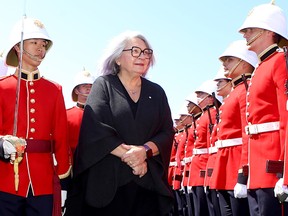The lawsuit brought by two French-advocacy groups argues that Simon’s inability to speak French violates two sections of Canada’s Charter of Rights

OTTAWA – A Quebec judge has ruled that a lawsuit demanding Governor General Mary Simon’s appointment be quashed because she doesn’t speak French deserves its day in court, rejecting the federal government’s second attempt to have the case thrown out.
The decision is another small legal victory for Quebec linguistic and constitutional rights groups who argue that Simon’s appointment is unconstitutional.
Two years ago, two French-advocacy groups and two individuals sued the federal government claiming it had breached its constitutional bilingualism obligations when Simon was appointed Governor General in 2021. Simon — an Inuk and Canada’s first Indigenous governor general — spoke English and Inuktitut, but not French. Her appointment broke with the longstanding tradition of governors general who spoke both of Canada’s official languages.
“The applicants seek to have the appointment of the Right Honourable Mary Simon as Governor General of Canada quashed, because they claim that the person who holds this office must be able to communicate in French and English” based on the Charter of Rights and Freedoms, Justice Marie-Hélène Dubé wrote in a ruling Monday.
Specifically, the groups argue that Simon’s inability to speak French violates two sections of the Charter: the equal status of French and English in Canada, and the right to be served by federal institutions in either official language.
Dubé rejected the federal government’s second attempt to have the lawsuit thrown out before it was litigated, according to the decision first reported by Radio-Canada.
In November, government lawyers argued that the lawsuit should be quashed as it had “no chance of success because it is not founded in law.”
They also argued that the applicants, the Association De Défense Des Droits Individuels Et Collectifs Du Québec (ADDICQ), Justice Pour le Québec and two individuals, should not have legal standing.
“The applicants’ position that the sovereign can only appoint a governor general who speaks both of Canada’s official languages is not supported by the constitutional provisions they invoke,” the government’s lawyers wrote in their arguments.
“The report of the advisory group established for the selection of the governor general and the advice of the prime minister regarding this appointment are not subject to judicial review,” they added.
But Dubé rejected the government’s request, finding that it was not “sufficiently evident” that the case was without legal merit. Rather, she concluded that prudence demanded the case be heard in full.
She also found that one of the applicants, Étienne-Alexis Boucher, had legal standing due to his Canadian citizenship, but called on the ADDICQ and Justice Pour Le Québec to amend their submissions within 30 days to prove their relevance to the case.
In June 2023, another Quebec Superior Court judge rejected the federal government’s claim that the case should be thrown out because it should have instead been filed in the Federal Court.
Justice Catherine Piché wrote that the Superior Court had the authority to hear the case and rejected the argument that the issue was exclusively the jurisdiction of the Federal Court.
“This was the second attempt by the Attorney General of Canada to avoid dealing with the merits of the case. And this is the second time that justice has closed the door on him and confirmed that the issue of the Governor General’s official bilingualism is a legitimate legal issue that must be heard,” Turp wrote.
When she was appointed Governor General in 2021, Simon conceded that she did not speak French but promised to begin language courses as soon as possible. She explained that she was educated in a federally run day school in northern Quebec and was not offered French classes.
Her appointment was largely celebrated in English Canada but created some unease in Quebec.
Théberge concluded that the decision to appoint Mary Simon is ultimately made by the prime minister, who is not a “federal institution” that is bound by the rules in the Official Languages Act.
National Post
Our website is the place for the latest breaking news, exclusive scoops, longreads and provocative commentary. Please bookmark nationalpost.com and sign up for our politics newsletter, First Reading, here.